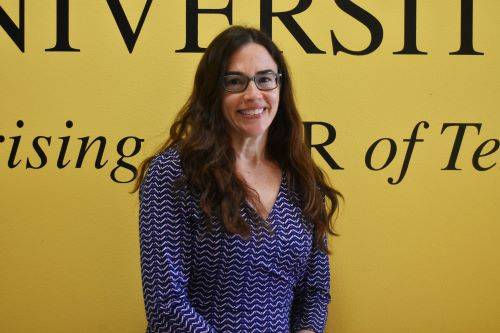Cindy Faith Miller, Ph.D.

Education:
Research Interests:
- Children’s social (e.g., gender stereotypes) and academic (e.g., growth mindset) cognitions
- Social factors that influence children’s engagement in stereotyped academic subjects (e.g., STEM) and diverse social groups
- School-based practices to promote inclusive and equitable school environments
Office of Research and Sponsored Programs: Faculty Research Spotlight
Promoting Inclusive Engineering Spaces for Elementary School Students
-
VITA
-
Biography
Cindy Faith Miller is an Assistant Professor in the Department of Counseling, Leadership, Adult Education & School Psychology. She is a Licensed Psychologist and a Nationally Certified School Psychologist. Prior to arriving at Texas State, Dr. Miller worked for 11 years as an Assistant Research Professor at Arizona State University (ASU). She also has over 3 years of experience serving students with emotional and behavioral difficulties as a School Psychologist at the Devereaux Foundation.
Dr. Miller’s research and service activities seek to understand and promote diversity, inclusion, and equity in educational settings. She studies social (e.g., gender stereotypes) and academic (e.g., growth mindset beliefs) cognitions and is involved in developing and implementing school-based interventions to promote positive peer relationships, inclusive school communities, and academic success. At ASU, Dr. Miller led a National Science Foundation-funded project designed to understand and promote engineering engagement in underrepresented children. The Equity in Engineering project involves exploring the role of stereotypes, achievement-related beliefs, and teacher/parent beliefs and practices, and implementing a growth mindset intervention to promote STEM engagement and performance in elementary school children.
Dr. Miller has experience teaching statistics, clinical, and developmental courses. Dr. Miller strives to incorporate inclusive pedagogical approaches so that all students have a strong sense of belonging. She has developed a research-informed teaching philosophy with the intention of facilitating inclusive, engaging, and stimulating learning communities.
Dr. Miller’s community activities involve conducting growth mindset workshops in local schools and sharing research findings with community partners. She has led multiple intervention and community-based projects (e.g., Sanford Harmony Program, Gender Equity Project, Better Together Challenge) to promote inclusive and equitable school environments. Dr. Miller enjoys collaborating with students on research/community-based projects and mentoring students on developing their own research and clinical pursuits.
In her personal life, Dr. Miller enjoys yoga, playing guitar, seeing live music, and spending time with her husband, children, and dogs. She loves spending time outdoors and is thrilled to be a part of the beautiful San Marcos community.
-
Selected Publications
Ozogul, G., Miller, C. F., & Reisslein, M. (2018). School fieldtrip to engineering workshop: Pre-,post-, and delayed-post effects on student perceptions by age, gender, and ethnicity. European Journal of Engineering Education. doi: 10.1080/03043797.2018.1518408
Miller, C. F., Kochel, K. P., Wheeler, L. A., Updegraff, K. A., Fabes, R. A., Martin, C. L., & Hanish, L. D. (2017). The efficacy of a relationship building intervention in 5th grade. Journal of School Psychology, 61, 75-88. doi: 10.1016/j.jsp.2017.01.002
Ozogul, G., Miller, C. F., & Reisslein, M. (2017). Latinx and Caucasian elementary school children’s knowledge of and interest in engineering activities. Journal of Pre-College Engineering Education Research, 7, 15-26. doi: 10.7771/2157-9288.1122
DeLay, D., Zhang, L.*, Hanish, L. D., Miller, C. F., Fabes, R. A., Martin, C. L., Updegraff, K., & Kochel, K. P. (2016). Peer influence on academic performance: A social network analysis of social-emotional intervention effects. Prevention Science, 17, 903-913. doi: 10.1007/s11121-016-0678-8
Kochel, K. P., Miller, C. F., Updegraff, K. A., Ladd, G. W., & Kochenderfer-Ladd, B. J. (2012).Associations among fifth graders’ gender atypical problem behaviors and peer relational maladjustment: A short-term longitudinal study. Journal of Youth and Adolescence, 41, 1022-1034. doi: 10.1007/s10964-011-9733-8Book Chapters
Miller, C. F. (2018). Gender Development. In M. Bornstein (Ed), The SAGE Encyclopedia of
Lifespan Human Development. Thousand Oaks, CA: SAGE Publications.
England, D. E.*, & Miller, C. F. (2018). Gender Socialization. In M. Bornstein (Ed), The SAGE
Encyclopedia of Lifespan Human Development. Thousand Oaks, CA: SAGE
Publications.
Martin, C. L., Fabes, R. A., Hanish, L. D., Gaertner, B., Miller, C. F., Foster, S., & Updegraff, K. A. (2017). Using an intergroup contact approach to improve gender relationships: A case study of a classroom-based intervention. In A. Rutland, D. Nesdale, & C. Brown (Eds), Handbook of Group Processes in Children and Adolescents. New York, NY: Wiley-Blackwell.
Miller, C. F. (2016). Theories of Gender Development. In N. Naples (Ed.), the Wiley-Blackwell
Encyclopedia of Gender and Sexuality Studies.
Hanish, L. D., Martin, C. L., Miller, C. F., Fabes, R. A., DeLay, D., & Updegraff, K. A. (2016).
Social harmony in schools: A framework for understanding peer experiences and their
effects. In K. Wentzel and G. Ramani (Eds.), Handbook on social-emotional, motivation,
and cognitive outcomes in school contexts. Taylor and Francis.
Frey, J. R., Elliott, S. N., & Miller, C. F. (2014). Best Practices in Social Skills Training. In A.
Thomas & P. Harrison (Eds.), Best Practices in School Psychology (6th ed., pp. 213-224).
Bethesda, MD: National Association of School Psychologists.
Miller, C. F., Martin, C. L., Fabes, R. A., & Hanish, L. D. (2013). Bringing the cognitive and
social together: How gender detectives and gender enforcers shape children’s gender
development. In M. R. Banaji & S. A. Gelman (Eds.), Navigating the Social World: What
infants, children, and other species can teach us. (pp. 306-313). New York: Oxford University Press.